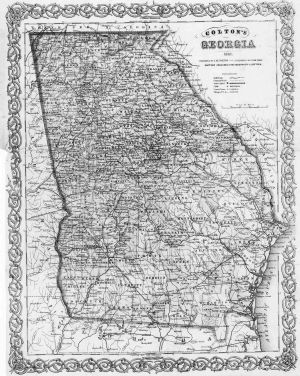 According to the Minutes of the 10th session of Georgia’s Oostanaula Baptist Association, not much is said about the war as the messengers gather this weekend at Friendship Church in Floyd County.
According to the Minutes of the 10th session of Georgia’s Oostanaula Baptist Association, not much is said about the war as the messengers gather this weekend at Friendship Church in Floyd County.
Probably that’s not particularly true. Lack of reported discussion is rather misleading even if this group of churches does hail from the northwestern part of the state, a section admittedly less secessionist than the portion lying south of Atlanta. Attendees primarily follow the usual course of enumerating themselves, sermonizing, praying, and giving committee reports. Before adjourning on Saturday, however, messengers “Resolved to hold a prayer meeting tomorrow morning to invoke the blessings of God upon our Solders (sic) now on the field & for a genuine Revival of Religion among all of our churches — & that – peace may soon be restored.” That bit of wording indicates the war is a serious concern in the general and private conversations of those gathered.
The Sabbath day prayer meeting begins at 9:00 in the morning. Rev. David M. Foreman, a missionary to the Cherokee, follows the prayer time with “a fine surmon from John 14 and 21” followed by more preaching from missionary J. T. Foster, after which a collection of $29.60 is taken. After lunch time, the association resumes at 2:30 p.m. with W. D. Gwinn preaching from Philippians 1:21, followed by Elder Martin, who preaches on the theme “Christians were made to rejoice.” Routine actions on Monday are followed by a closing hymn and a prayer led by N. R. Smith of Macedonia Church, after which delegates begin their journeys homeward.
Did their prayers have an effect on the war? Who can say? But, on October 21, while Oostanaula Baptists are completing their regular program and walking or riding away, Union forces suffer what could only be considered a serious rout in the second major engagement of the war. The Battle of Ball’s Bluff in Loudoun County, Virginia, pits 1,709 Confederate soldiers from Mississippi and Virginia against 1,720 troops under Union Gen. Charles Stone, who would later spend six months in prison on treason charges for his ineptitude that day. Col. Edward Baker, a close friend to President Abraham Lincoln, is killed along with four dozen others and 158 are wounded–not to mention the 714 missing and captured. Confederate forces suffer 33 killed, 115 wounded, and one missing. Coming three months after the Battle of Bull Run/First Manassas, this is not news the Washington, D.C. politicians want to hear.
We have to wonder if those who bowed their heads and bent their knees on October 20 connected their entreaties to God with the consequences of the meeting of two armies on a field far away the next day. It would have been some days before they heard about it of course, but some of them may still have pondered the probabilities and possibilities of earnest prayer and its effect on the unmitigated inadequacy of the general designated to lead the blue troops that day.
Sources: Battle information (link); Oostanaula Baptist Association Minutes, 19-21 October 1861
Story written by Arlette Copeland, Special Collections Assistant, Jack Tarver Library Special Collections, Mercer University, Macon, GA


